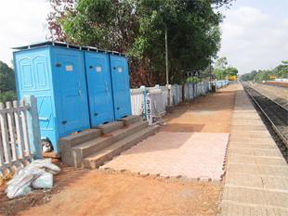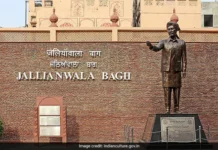 LONDON: UK-based NRI industrialist Lord Swraj Paul’s Caparo Group plans to install environment- friendly bio digester toilets across India which it created along with the DRDO, aimed at improving living standards in the country’s rural and urban areas.
LONDON: UK-based NRI industrialist Lord Swraj Paul’s Caparo Group plans to install environment- friendly bio digester toilets across India which it created along with the DRDO, aimed at improving living standards in the country’s rural and urban areas.
“We’re privileged to work with DRDO (Defense Research and Development Organization) technology to create bio digester toilets which we will now be installing around the country,” Chief Executive Officer Angad Paul said.
“This eliminates the need for plumbing and allows faecal matter to be reduced to usable water and gases,” he said at the Institute of Directors London Global Summit on Corporate Governance and Sustainability at House of Lords last evening.
Prime Minister Narendra Modi had asked parliamentarians and the corporate sector to help build separate toilets for girls in schools across the country by next year.
In his first Independence Day address this year, Modi had also pitched for making provisions for building toilets wherein women should not defecate in open.
Noting that many people know Caparo because of the T1 car (racing car) that it developed, Angad said, “This was Caparo’s first foray into composites. As a result of this, we have now developed composite housing for India which is quicker and cheaper to erect and stronger than conventional building methods.
“The most exciting part of this development is that we will soon be making the composite material from organic matter. A truly sustainable solution that serves the needs of a growing India. In addition, we are looking at aggregating this with bio digester toilets and reusable waste to energy.”
Angad, son of Lord Paul, commended the Modi government’s policies on hygiene and alternative energy, saying “We at Caparo India have for the last two years developed a range of products designed to improve standards in rural and urban areas.
“We started as an automotive components company in India and were part of a revolution in transportation but I realized some time ago that we too were focused on the highest common denominator as a market.
“Part of sensible sustainable business is to react to the needs of your surroundings, and India is much more than a car and truck driving public, so now we are making electric rickshaws for both urban and rural areas.”
He said Prime Minister Modi and his team are facing a Herculean task and they have made the appropriate start.
“What they face in front of them is exactly what we all face as directors of corporate entities, particularly when it relates to issues of governance and sustainability,” he added.
“We have developed an electric motor which is more robust and powerful and suspension systems in our vehicles that are better suited to problematic roads,” Angad said, adding the company is working closely with local authorities to ensure that there are genset driven and solar power charging points.
“As another business vertical, we have already been implementing installations of solar power in many institutional buildings and would like to do more. The economics of solar technology are substantially improving and we should be able to work towards sunlight as a viable alternative in suitable and particular applications,” he said.
Noting that India’s real future lay in utilizing its large quantities of natural waste to create energy, Angad said, “In our own facilities we have already been installing systems to reuse canteen waste and redeliver energy and I am pleased to say that we’ve also been asked by other concerns to put the same in for them.
“This will lead to us further developing technologies in the utilization and gasification of waste of all kinds. We do have a gas based power company, Caparo Power and we will use the commercial knowledge from this to backward integrate.”
Angad said that over the last six years he has teamed up to implement large scale sustainable agriculture in Africa.
“This cuts to the heart of my views on wasteful business.
My associates and I have over 100,000 hectares (over 2,47,100 acres) of land in Sierra Leone to develop as large scale farms and we have been busy planting.”
He also paid tribute to four of his workers who were infected with the deadly Ebola virus in the last few weeks.
“We have however on our farms been able to contain this horrible disease and have been able to cure 19 further people that were affected,” he said.
Despite the fertile and naturally productive land, “most African nations today are large importers of food. It’s our collective responsibility to break these imbalances and stop unnecessarily transporting goods around the world,” he said.
The Caparo Group has also concluded the bankable feasibility study for one of the largest scale irrigated farming projects in the world in Namibia.
“The Caprivi Strip in Namibia is one of, if not the most arid and deprived areas on the globe with one of the highest incidences of AIDS. Yet the Zambezi flows just to the north of this area and the Trans-African Highway runs even closer.
“We have been able to legislate with 5 countries for water rights to build a canal and provide 25,000 to 30,000 hectares of irrigated farming. We can also plant crops that can be nurtured in harsher environments adjacent to this land. This can truly create micro-economies and provide food, sustainably and profitably to all neighboring regions.
“All these projects are for profit. None of what I’ve said is against the creation of profit. I believe in adding value for profit, then utilizing that profit sustainably, to create even greater added value,” he said.
The event at the House of Lords was attended by Minister of State for Commerce and Industry Nirmala Sitharaman and MP Meenakshi Lekhi among others.–PTI






